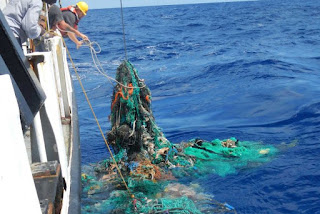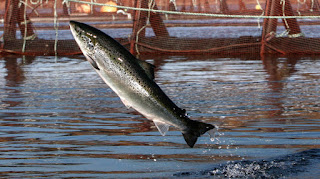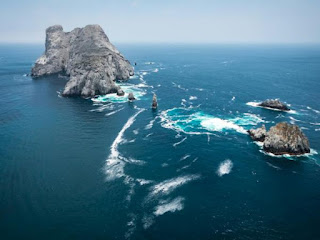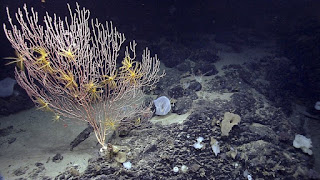1. UK Plans Plastic Bottle Charge to Tackle Pollution
 The British government has announced plans to put a “charge on plastic, glass and metal single use drinks containers sold in England.” Britain uses 13 billion plastic containers a year, many of which end up in the oceans. "It is absolutely vital we act now to tackle this threat and curb the millions of plastic bottles a day that go unrecycled," said environment minister Michael Gove. The actual deposit scheme may resemble those already in place in Denmark, Sweden and Germany.
The British government has announced plans to put a “charge on plastic, glass and metal single use drinks containers sold in England.” Britain uses 13 billion plastic containers a year, many of which end up in the oceans. "It is absolutely vital we act now to tackle this threat and curb the millions of plastic bottles a day that go unrecycled," said environment minister Michael Gove. The actual deposit scheme may resemble those already in place in Denmark, Sweden and Germany.2. Sustainable Shark Trade Bill Offers Science-Based Solutions for Overfishing and Finning
![shark trade bill: Photo credit: <a href="https://visualhunt.com/author/e0bc0f">[f/]*</a> on <a href="https://visualhunt.com/re/c46da7">Visualhunt</a> / <a href="http://creativecommons.org/licenses/by-nc-sa/2.0/"> CC BY-NC-SA</a> shark fin, shark trade bill](https://blogger.googleusercontent.com/img/b/R29vZ2xl/AVvXsEiySLwMoXLzkg78IcmS7yFQx_aSlyXKvx-DXja8rk-_dtEzK_iq6QACI_8tI4FmteetRn-4FI-SFu3P5SKmYDs3vAKfj2zzL6nHosa6pSLwFOCWbRkp_wivrWs1nDWBxPr__CvGlyDR7O8/s320/shark-fin.jpg) “A new bipartisan bill, Sustainable Shark Fisheries and Trade Act of 2018, introduced in U.S. Congress this month encourages a science-based approach to significantly reduce the overfishing and unsustainable trade of sharks, rays and skates around the world and prevent shark finning. The Act would require that shark, ray and skate parts and products imported into the U.S. be permitted only from countries certified by the National Oceanic and Atmospheric Administration (NOAA) as having in place and enforcing management and conservation policies for these species comparable to the U.S. A comparable prohibition on shark finning — the wasteful and inhumane practice of cutting off a shark’s fins and discarding the carcass at sea — would also be required.”
“A new bipartisan bill, Sustainable Shark Fisheries and Trade Act of 2018, introduced in U.S. Congress this month encourages a science-based approach to significantly reduce the overfishing and unsustainable trade of sharks, rays and skates around the world and prevent shark finning. The Act would require that shark, ray and skate parts and products imported into the U.S. be permitted only from countries certified by the National Oceanic and Atmospheric Administration (NOAA) as having in place and enforcing management and conservation policies for these species comparable to the U.S. A comparable prohibition on shark finning — the wasteful and inhumane practice of cutting off a shark’s fins and discarding the carcass at sea — would also be required.”
---------------------------------------------------
4. Great Pacific Garbage Patch Plastic Pollution is Larger Than Thought and ‘Growing Exponentially'
 A new study shows that the Great Pacific Garbage Patch has 16 times more trash than previously surveyed. There is 78,000 tons of trash spread over an area of 1.6 million square kilometers. “Most of the mass was made up of pieces larger than 5 centimetres. While microplastics, which account for about 8 percent of the mass, made up a bulk of the estimated 1.8 trillion pieces of plastic floating in the patch.” Previous sampling estimated the patch at 4,800 tons of trash. Half of the larger debris was made up of fishing gear.
Read More...
A new study shows that the Great Pacific Garbage Patch has 16 times more trash than previously surveyed. There is 78,000 tons of trash spread over an area of 1.6 million square kilometers. “Most of the mass was made up of pieces larger than 5 centimetres. While microplastics, which account for about 8 percent of the mass, made up a bulk of the estimated 1.8 trillion pieces of plastic floating in the patch.” Previous sampling estimated the patch at 4,800 tons of trash. Half of the larger debris was made up of fishing gear.
Read More...
3. Washington State Bans Atlantic Salmon Farms
 After three decades of Atlantic salmon farming, Washington state signed into law “restrictions on non-native fish farms.” This is in response to the accidental release of 250,000 Atlantic salmon into Puget Sound eight months ago. “The state's remaining Atlantic salmon farms, all owned by Cooke Aquaculture, could be gone by 2022, once their existing leases with the Washington Department of Natural Resources expire.”
Read More...
---------------------------------------------------
After three decades of Atlantic salmon farming, Washington state signed into law “restrictions on non-native fish farms.” This is in response to the accidental release of 250,000 Atlantic salmon into Puget Sound eight months ago. “The state's remaining Atlantic salmon farms, all owned by Cooke Aquaculture, could be gone by 2022, once their existing leases with the Washington Department of Natural Resources expire.”
Read More...
---------------------------------------------------
 After three decades of Atlantic salmon farming, Washington state signed into law “restrictions on non-native fish farms.” This is in response to the accidental release of 250,000 Atlantic salmon into Puget Sound eight months ago. “The state's remaining Atlantic salmon farms, all owned by Cooke Aquaculture, could be gone by 2022, once their existing leases with the Washington Department of Natural Resources expire.”
After three decades of Atlantic salmon farming, Washington state signed into law “restrictions on non-native fish farms.” This is in response to the accidental release of 250,000 Atlantic salmon into Puget Sound eight months ago. “The state's remaining Atlantic salmon farms, all owned by Cooke Aquaculture, could be gone by 2022, once their existing leases with the Washington Department of Natural Resources expire.”4. Great Pacific Garbage Patch Plastic Pollution is Larger Than Thought and ‘Growing Exponentially'
 A new study shows that the Great Pacific Garbage Patch has 16 times more trash than previously surveyed. There is 78,000 tons of trash spread over an area of 1.6 million square kilometers. “Most of the mass was made up of pieces larger than 5 centimetres. While microplastics, which account for about 8 percent of the mass, made up a bulk of the estimated 1.8 trillion pieces of plastic floating in the patch.” Previous sampling estimated the patch at 4,800 tons of trash. Half of the larger debris was made up of fishing gear.
A new study shows that the Great Pacific Garbage Patch has 16 times more trash than previously surveyed. There is 78,000 tons of trash spread over an area of 1.6 million square kilometers. “Most of the mass was made up of pieces larger than 5 centimetres. While microplastics, which account for about 8 percent of the mass, made up a bulk of the estimated 1.8 trillion pieces of plastic floating in the patch.” Previous sampling estimated the patch at 4,800 tons of trash. Half of the larger debris was made up of fishing gear.
---------------------------------------------------
5. Prince Albert II of Monaco Visits Malpelo Island
 Thanks to Sea Save’s strategic partner, Columbia Dive Adventures, Prince Albert II of Monaco visited Malpelo Island, Colombia aboard the Ferox. Research topics discussed with the Colombian Navy included oceanography, biology and the marine sciences. Malpelo Island is a UNESCO World Heritage Site. There are many species of shark present, including schools of hammerhead and silky sharks.
Thanks to Sea Save’s strategic partner, Columbia Dive Adventures, Prince Albert II of Monaco visited Malpelo Island, Colombia aboard the Ferox. Research topics discussed with the Colombian Navy included oceanography, biology and the marine sciences. Malpelo Island is a UNESCO World Heritage Site. There are many species of shark present, including schools of hammerhead and silky sharks.Read More...
---------------------------------------------------
 Fishermen groups are suing to “challenge the creation of the Northeast Canyons and Seamounts Marine National Monument created by President Barack Obama in 2016. It’s a 5,000-square-mile area off of New England that contains fragile deep sea corals and vulnerable species of marine life such as right whales.” If won, the suit would open the marine monument to commercial fishing. Environmental organizations are concerned the fishing would interfere with “preservation efforts.”
Read More...
-----------------------------------------------
Fishermen groups are suing to “challenge the creation of the Northeast Canyons and Seamounts Marine National Monument created by President Barack Obama in 2016. It’s a 5,000-square-mile area off of New England that contains fragile deep sea corals and vulnerable species of marine life such as right whales.” If won, the suit would open the marine monument to commercial fishing. Environmental organizations are concerned the fishing would interfere with “preservation efforts.”
Read More...
-----------------------------------------------
 The cities of San Francisco and Oakland have sued the big 5 oil companies. During the case, Chevron’s lawyer stated, “From Chevron’s perspective, there is no debate about the science of climate change.” Chevron accepts the 97% expert consensus that climate change exists due to human influences. “If even Big Oil (with 40 years of research) accepts the reality of human-caused climate change when pressed in court, it’s difficult for anyone else to deny it from here forward.”
Read More...
---------------------------------------------------------------------------
The cities of San Francisco and Oakland have sued the big 5 oil companies. During the case, Chevron’s lawyer stated, “From Chevron’s perspective, there is no debate about the science of climate change.” Chevron accepts the 97% expert consensus that climate change exists due to human influences. “If even Big Oil (with 40 years of research) accepts the reality of human-caused climate change when pressed in court, it’s difficult for anyone else to deny it from here forward.”
Read More...
---------------------------------------------------------------------------
Be sure to "LIKE" http://facebook.com/SeaSave to ensure our "Week in Review" is delivered to your newsfeed every Friday.
6. Fisherman Lawsuit Against Atlantic Marine Monument Moves Ahead
 Fishermen groups are suing to “challenge the creation of the Northeast Canyons and Seamounts Marine National Monument created by President Barack Obama in 2016. It’s a 5,000-square-mile area off of New England that contains fragile deep sea corals and vulnerable species of marine life such as right whales.” If won, the suit would open the marine monument to commercial fishing. Environmental organizations are concerned the fishing would interfere with “preservation efforts.”
Fishermen groups are suing to “challenge the creation of the Northeast Canyons and Seamounts Marine National Monument created by President Barack Obama in 2016. It’s a 5,000-square-mile area off of New England that contains fragile deep sea corals and vulnerable species of marine life such as right whales.” If won, the suit would open the marine monument to commercial fishing. Environmental organizations are concerned the fishing would interfere with “preservation efforts.”
7. In Court, Big Oil Rejects Climate Denial
 The cities of San Francisco and Oakland have sued the big 5 oil companies. During the case, Chevron’s lawyer stated, “From Chevron’s perspective, there is no debate about the science of climate change.” Chevron accepts the 97% expert consensus that climate change exists due to human influences. “If even Big Oil (with 40 years of research) accepts the reality of human-caused climate change when pressed in court, it’s difficult for anyone else to deny it from here forward.”
The cities of San Francisco and Oakland have sued the big 5 oil companies. During the case, Chevron’s lawyer stated, “From Chevron’s perspective, there is no debate about the science of climate change.” Chevron accepts the 97% expert consensus that climate change exists due to human influences. “If even Big Oil (with 40 years of research) accepts the reality of human-caused climate change when pressed in court, it’s difficult for anyone else to deny it from here forward.”Be sure to "LIKE" http://facebook.com/SeaSave to ensure our "Week in Review" is delivered to your newsfeed every Friday.
Sea Save Foundation is committed to raising awareness of marine conservation. The Week in Review is a team effort produced by the Sea Save staff to provide a weekly summary of the latest in marine research, policy, and news.